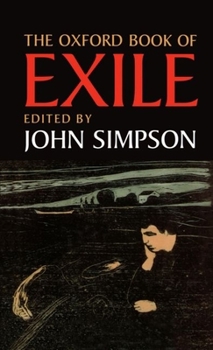The Oxford Book of Exile
Select Format
Select Condition 
Book Overview
From the moment Adam and Eve were expelled from Paradise, exile has been a part of the human experience. The circumstances in which individuals or entire peoples are compelled to leave their homeland are as various as they are numerous, and how people react to exile also varies widely. Think of the wit of Alexander Herzen, or the quiet despair of Oscar Wilde, sitting outside the Cafe' de Flore in the Boulevard St. Germain in the hope that someone will pay for his coffee, or the comfortable life of Sir Richard and Lady Burton in their garconnerie in Trieste, or the angst of Albert Camus, or the wanderings of Jack Kerouac. Now, in The Oxford Book of Exile, John Simpson has brought together examples of exile from all over the world, and from all periods of history.
Here is an intense record of the experience of exile, with writers from Ovid to Solzhenitsyn describing their emotions, their struggle, and their despair. For those who have chosen a life in exile, Simpson shows how the response is more mixed: ambivalence about the country they have left and the country they have chosen suffuses the writing of these intellectuals. We read of literary expatriates, such as Henry James, Gertrude Stein, Ernest Hemingway, Henry Miller, and James Joyce. There is also the happy life of exiles in utterly foreign places, such as Robert Louis Stevenson in Samoa or Paul Gauguin in Tahiti. And those persecuted for their faith--such as the Pilgrims at Plymouth or the Ayatollah Khomeini in France--rub shoulders with those fleeing from war, or from debt, or even from the weather.
Castaways and spies, premiers and princes describe their departure, their reception, and sometimes their return, in an anthology that is by turns inspiring, moving, and deeply thought-provoking. With sources ranging from police records, newspaper articles, interviews, letters, and memoirs, as well as verse and fiction, and settings as remote as Iran and Russia, China and Palestine, The Oxford Book of Exile provides fascinating insight into an experience that touches so many, and captures the imagination of us all.
Here is an intense record of the experience of exile, with writers from Ovid to Solzhenitsyn describing their emotions, their struggle, and their despair. For those who have chosen a life in exile, Simpson shows how the response is more mixed: ambivalence about the country they have left and the country they have chosen suffuses the writing of these intellectuals. We read of literary expatriates, such as Henry James, Gertrude Stein, Ernest Hemingway, Henry Miller, and James Joyce. There is also the happy life of exiles in utterly foreign places, such as Robert Louis Stevenson in Samoa or Paul Gauguin in Tahiti. And those persecuted for their faith--such as the Pilgrims at Plymouth or the Ayatollah Khomeini in France--rub shoulders with those fleeing from war, or from debt, or even from the weather.
Castaways and spies, premiers and princes describe their departure, their reception, and sometimes their return, in an anthology that is by turns inspiring, moving, and deeply thought-provoking. With sources ranging from police records, newspaper articles, interviews, letters, and memoirs, as well as verse and fiction, and settings as remote as Iran and Russia, China and Palestine, The Oxford Book of Exile provides fascinating insight into an experience that touches so many, and captures the imagination of us all.
Format:Hardcover
Language:English
ISBN:0192142216
ISBN13:9780192142214
Release Date:May 1995
Publisher:Oxford University Press, USA
Length:368 Pages
Weight:1.74 lbs.
Dimensions:1.3" x 6.4" x 9.5"
Customer Reviews
1 rating
Oh to be in England now that ....
Published by Thriftbooks.com User , 25 years ago
The Oxford Book of Exile is clearly written from the prospective of The Englishman abroad. These choices of different ex-pats feelings conjure up that nostalgic sense that the old country is never very far from the soul. The range of choices is not confined to the Brits but their thinking seems to dominate. Like all foreign corresponents,John Simpson, the editor touches on the fact that in seconds the journalist covering a foreign country becomes an expert on arrival. Graham Greene who is quoted in the anthology would be proud of the choices. Peter Robinson,editor of San Francisco Books and Travel.






